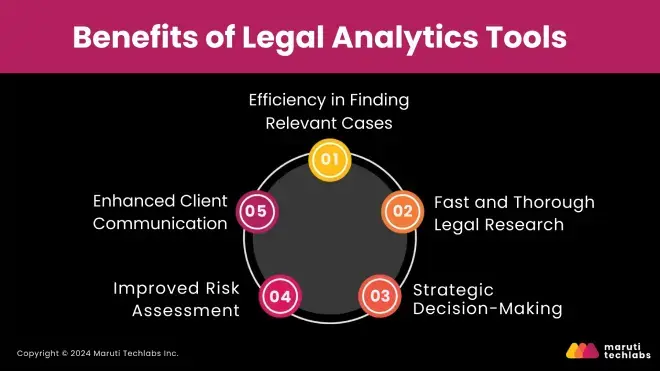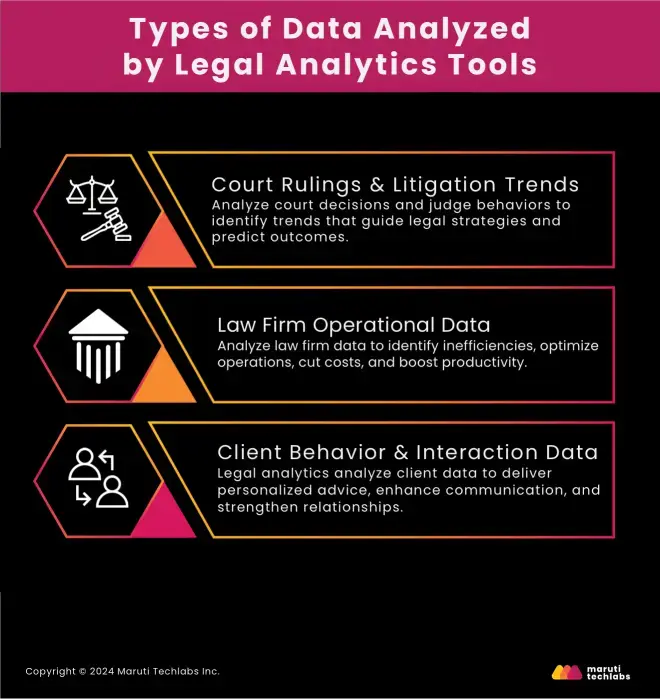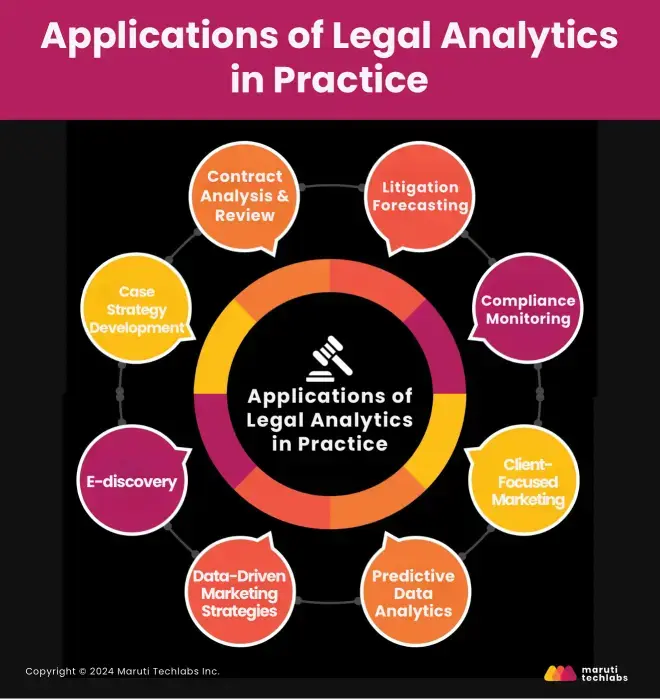

Legal Analytics and the New Era of Informed Decision Making






When a business encounters critical decisions like market expansion, product launches, or complex regulations—it can't rely on guesswork or outdated methods. This is where legal analytics plays a crucial role. Just as law firms utilize analytics to uncover patterns and predict outcomes in their cases, businesses can adopt this approach to make more informed decisions.
By merging these insights with their industry expertise, companies can confidently tackle these critical junctures, ensuring they make choices that lead to more efficient, strategic, and successful outcomes.
This brief guide explores how legal analytics reshapes legal practice, from improving case strategies to refining marketing approaches and examining future trends.
Legal analytics involves data analysis, computation, and information technology to extract actionable insights from legal data. It is slowly but steadily altering how practitioners think about legal decision-making. Instead of having to make quick guesses, legal personnel can now work with actual data.
The systematic collection and analysis of large amounts of legal data, including case results, judicial decisions, or litigation trends, supports legal planning. For example, Previous case recordings help law firms assess their chances of winning and identify critical arguments, transforming legal data into actionable insights for strategy.
Now that you know legal analytics, let’s explore how its benefits enable legal professionals to predict outcomes, optimize strategies, and confidently make data-driven decisions.
Legal analytics tools have become essential for modern law firms, enabling them to work smarter and more effectively.

These tools bring clear advantages that include:
Legal analytics tools significantly speed up the research process by quickly sifting through vast legal databases to find cases directly relevant to your situation. Instead of spending hours searching, legal professionals can find the information they need in minutes, freeing up time for more critical tasks like strategizing and case analysis.
These tools enable rapid examination of extensive legal documents, past rulings, and case law, offering insights much faster than traditional methods. Lawyers can access detailed analyses faster, saving time and improving the quality of their research, ensuring they have a comprehensive understanding of the case.
Legal analytics provides actionable insights that help formulate stronger legal arguments. These tools for law firms allow them to tailor their strategies more effectively, making their case presentations more compelling and well-informed.
By analyzing outcomes of similar past cases, legal analytics helps lawyers assess the potential risks and benefits of pursuing specific legal actions. This data-driven approach allows them to make more informed decisions about pursuing a case, negotiating a settlement, or adjusting their strategy, ultimately reducing uncertainties.
Data-driven insights enable lawyers to communicate more clearly and transparently with their clients. Instead of vague predictions, they can present clients with concrete data about potential outcomes, timelines, and risks, which builds trust and ensures that clients feel more involved and informed throughout the process.
As legal analytics proves its value in transforming legal work, let’s examine the technological advancements driving this evolution and how they shape the legal industry’s future.
Let’s look at some vital technological components driving this change:
We can now draw valuable insights enhancing legal research and analysis using AI technologies such as machine learning, natural language processing (NLP), and predictive analytics. These technologies enable the identification of trends in case law, predictions on litigation outcomes, and the automation of repetitive tasks, ultimately helping legal professionals focus on more strategic aspects of their work. According to the 2023 State of Practice: Legal Landscape report by Bloomberg Law, 53%of legal professionals use AI tools like machine learning to conduct legal research, while 34% use them for document review.
NLP has made searching through legal documents far more intuitive. NLP technology enables users to search with natural phrases and find relevant information without complex legal jargon. Numerous tools have proven effective in delivering accurate, context-rich search results, significantly speeding up the research process.
Let’s explore the different types of data these legal tools analyze and how these insights improve legal practices.
Legal analytics tools do more than just collect information; they delve into complex data sets to uncover significant patterns, transforming raw data into valuable strategic insights.

Here are the key types of data these tools analyze:
These tools assess historical court decisions and litigation records and judge behaviors to identify trends that inform legal strategies. For example, knowing how a specific judge has ruled in similar cases can help formulate a more compelling argument or anticipate possible outcomes.
They also evaluate internal data from law firms—such as billing records, time tracking, and case management workflows—to pinpoint inefficiencies and areas that need improvement. They analyze staff productivity, case outcomes, and client satisfaction metrics, helping firms understand how their operations are performing.
This analysis enables law firms to optimize operations, manage expenses more effectively, and boost productivity.
Legal analytics can better understand client behaviors and needs by analyzing client interactions, case histories, and preferences. This insight allows law firms to deliver personalized advice, enhance communication, and strengthen client relationships.
We’ve seen the variety of data legal analytics can dissect. Let’s explore how these insights translate into real-world applications that enhance legal practices and outcomes.
Legal analytics is transforming the legal profession by enhancing both efficiency and precision.

Here’s how it’s making a difference:
Legal analytics helps streamline reviewing, searching, and compiling electronically stored information (ESI) relevant to a case. With e-Discovery tools, you can filter documents by date range or specific keywords, eliminating the tedious task of manually sifting through large volumes of documents. This seamless approach removes the strain of navigating countless files, allowing for more efficient case preparation.
Legal analytics analyze scenarios to provide direction on how they should be addressed, similar to finding information on how similar circumstances were managed. When lawyers can access data on how a particular judge has ruled in similar cases, they can tailor their arguments more effectively, increasing their chances of success.
Manually reviewing contracts is often time-consuming and prone to errors. Legal analytics tools quickly scan contracts to highlight risks, inconsistencies, or unusual clauses, ensuring nothing important is overlooked and making the process far more efficient.
Legal professionals use analytics to predict potential outcomes and settlements based on data from previous cases. This enables them to make informed decisions about addressing negotiations or proceeding with a case.
Analytics tools monitor regulatory changes and compliance requirements, ensuring businesses stay updated and avoid potential legal risks. Thus, they help maintain legal integrity.
As legal analytics continues to streamline various legal tasks, it also plays a crucial role in shaping client-focused marketing strategies. By analyzing client behavior, preferences, and feedback, law firms can better understand their ideal clients and tailor their outreach efforts. This targeted approach helps law firms reach and engage with prospective clients more effectively, enhancing overall client acquisition and retention.
Predictive analytics processes large volumes of legal data to spot trends and patterns to help lawyers foresee potential outcomes. Instead of relying on guesswork, they use predictive models to understand what to expect in similar cases.
For example, it allows them to anticipate the chances of litigation success or identify factors influencing a judge’s decision. This predictive power equips lawyers with valuable insights that help refine their approach and increase the likelihood of favorable outcomes.
Legal analytics uses data analysis to identify target client demographics, behaviors, and concerns, allowing businesses to make informed decisions rather than relying on assumptions. For example, a firm subscribing to business law may apply analytics to learn which industries, sizes of companies, or regions are more prone to its services. This insight helps the firm position itself effectively in the market, ensuring its marketing efforts resonate with the target audience.
Knowing the target market through legal analytics allows firms to create better marketing strategies. Clarifying which methods work best helps firms improve their targeting approaches, focusing on what is most effective.
For instance, management is informed that clients are more receptive to blogs that provide information, case studies, etc. In that case, the firm may consider creating this type of content to generate and cultivate its target client base.
Applying legal analytics evolves methodology in legal analysis, transforming best practices within the field. Adopting advanced analytical tools, the legal industry, particularly law firms, is dispensing legal services in an optimized, efficient, and effective manner and modality. This evolution alters the methods of dealing with case results, risks, and clients.
Though data privacy and ethical issues are persistent challenges, addressing them can create new opportunities and drive innovation. Data analysis and visualization are also crucial throughout the development process, enabling AI to play a central role in guiding strategies and making informed decisions.
Want to gauge your firm's preparedness for AI and legal analytics? Try our AI Readiness Assessment Tool to find out where you stand.
Are you prepared for legal analytics to revolutionize your practice and transform the legal profession? At Maruti Techlabs, we provide a range of IT solutions, from tailored software product development to sophisticated cloud consulting, to help maximize your organization’s productivity.
Don’t let outdated tools and traditional methods slow you down. Get in touch with us today to see how we can elevate your digital capabilities and keep you ahead in the market.
No. Legal analytics is a tool that complements your expertise, not a replacement. It helps one make more informed decisions by providing data-driven strategies. Your legal knowledge, experience, and judgment are still crucial, but you can make more precise and confident choices with analytics.
Adopting legal analytics doesn’t have to be overwhelming. Many user-friendly tools can be tailored to fit seamlessly into your existing processes. Start with one aspect, such as e-discovery or case outcome predictions, and expand as you become more comfortable. The key is to view it as an investment in efficiency that will save time and effort in the long run.
No, legal analytics is valuable for firms of all sizes. Smaller firms can gain a competitive edge by using these tools, allowing them to operate with the same insight and efficiency as larger firms. Analytics can improve your research, strategy, and communication with clients, all without needing a large support team.

![[GetPaidStock.com]-65b9d3432ecc1.webp](https://cdn.marutitech.com/small_Get_Paid_Stock_com_65b9d3432ecc1_c1b16b05fb.webp)
